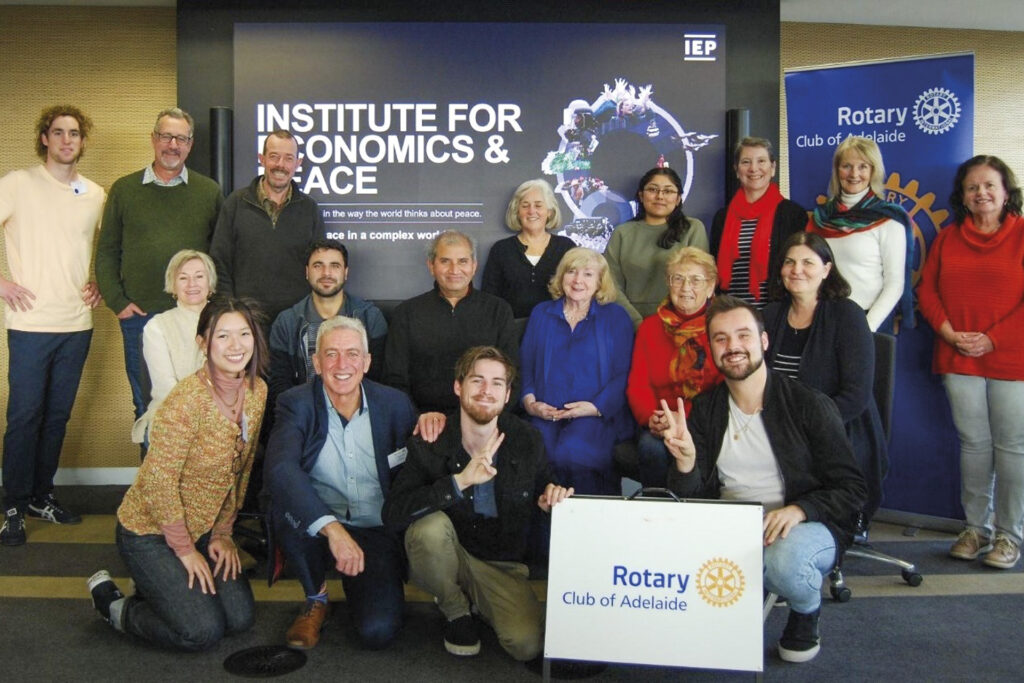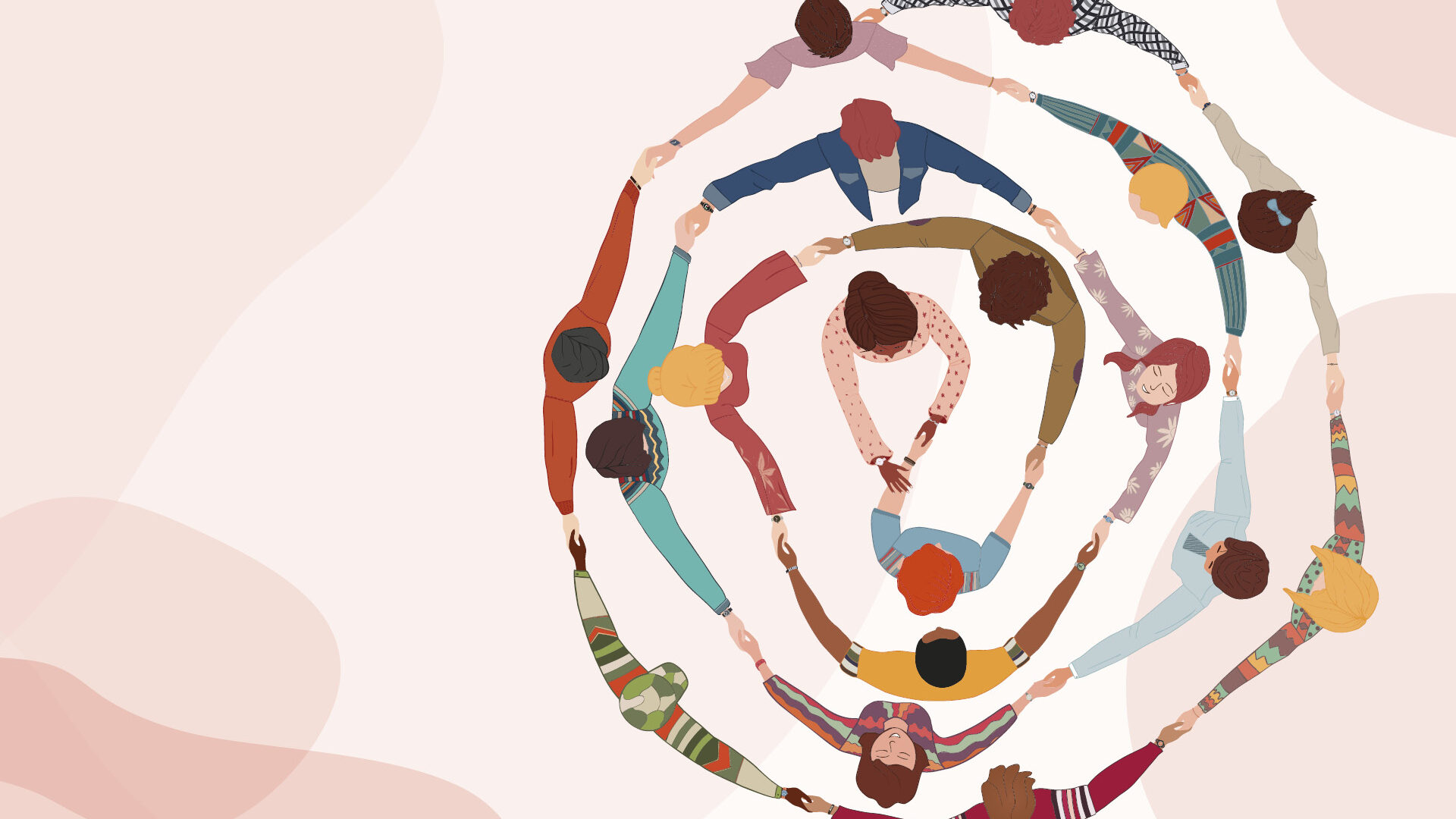For several years, Rotary has had a global partnership with the Sydney-based Institute for Economics and Peace (IEP). Peace is a complex issue, but IEP’s approach is to bring clarity by measuring the eight key pillars of peace.
This research then forms the basis for Positive Peace programs in which Rotary clubs and members can participate, delivering tangible peacebuilding outcomes. Together, Rotary and IEP have developed an international network of over 150 peacebuilders, known as Positive Peace Activators.
Positive Peace is at the heart of the Institute for Economics and Peace and Rotary’s strategic partnership. Launched in 2017, the Rotary-IEP partnership was designed to enhance Rotary’s peace and conflict resolution efforts with data-driven methodologies and tools.

What is IEP?
IEP is an independent, non-partisan, not-for-profit think tank dedicated to building a greater understanding of the key drivers of peace, as well as identifying the economic benefits that increased peacefulness can deliver.
The organisation aims to create a paradigm shift in the way the world thinks about peace; achieved by developing global and national indices, calculating the economic cost of violence, analysing country-level risk and fragility, and understanding Positive Peace.
This research is used extensively by governments, academic institutions, think tanks, non‑governmental organisations and intergovernmental institutions such as the OECD, the Commonwealth Secretariat, the World Bank and the United Nations.
Why does the Rotary-IEP partnership exist?
A joint focus on peacebuilding and conflict prevention, one of Rotary’s seven areas of focus, inspired the partnership. IEP’s work on Positive Peace suggests that lasting peace must be built on the active presence of good factors such as access to vital services, good governance, a sound business environment, and respect for human rights.
Serving to reinforce and enhance Rotary’s work, Positive Peace offers a theory of peacebuilding and conflict prevention that informs Rotarians’ work in communities around the globe.
The three key outputs of the partnership – namely the Positive Peace Activators Program, the Rotary Positive Peace Academy, and Rotary Positive Peace Workshops – show Positive Peace as an understandable and actionable framework for Rotarians to deliver peace projects in their local communities.

What is Positive Peace?
Originally theorised by Johan Galtung, IEP defines Positive Peace as the attitudes, institutions and structures that create and sustain peaceful societies. Higher levels of Positive Peace are linked to higher GDP growth, better environmental outcomes, higher measures of wellbeing, better developmental outcomes, and stronger resilience.
IEP uses the concept of Positive Peace not only as a tool for measurement, but as a starting point for activating peace within communities.
Rotary Positive Peace Activators Program: East Africa
To ensure the progression of Positive Peace work, Rotary and IEP have developed an international network of peacebuilders, known as Positive Peace Activators. From its conception in 2020, the Positive Peace Activator program has trained five cohorts across Latin America, North America, Europe, South-East Asia, and recently, East Africa.
These 150 (and growing!) Positive Peace Activators have been trained to lead initiatives in the form of lectures, workshops and ongoing projects, in addition to educating others and acting as peace mentors for their regional Rotary clubs.
In early September, 40 peacebuilding professionals gathered at Makerere University in Kampala, Uganda, for the East African Activators Training Program. Led by professionals from IEP and Rotary International, the group engaged in three days of activities and discussions.
Rotary International president Jennifer Jones not only attended the launch, but immersed herself in the Positive Peace Pillar Mapping exercise, alongside participants.
Rotary International’s Rebecca Crall explained that East Africa was carefully chosen as the next region for Activators, due to the existing commitment to peace displayed through the Makerere Peace Centre. Following the success of this cohort, plans have begun for West and North African Positive Peace Activator cohorts in the coming months.
“Rotary’s strength is investing and building capacity in peacebuilders. This program is one of our best in ensuring that we are living up to our goals and achieving the impact we want to see in the world,” Rebecca said.
“Serving to reinforce and enhance Rotary’s work, Positive Peace offers a theory of peacebuilding and conflict prevention that informs Rotarians’ work in communities around the globe.”
Peace 911: a Rotary-IEP Positive Peace project in the Philippines
One of the most promising developments in peacebuilding recently has been the exploration of the use of the eight pillars model of Positive Peace in an increasing number of areas where violent conflict has prevailed.
Many adults in Paquibato, a small district in the Philippines, talked about not knowing anything else but violent conflict since the 1960s under the Marcos administration’s martial law, which saw atrocities committed by both the military and the New People’s Army.
Concerned about lives and opportunities lost, the mayor formed the Davao City Advisory Committee on Peace and Development (DC PEACE-DEV) to engage in local peacebuilding. Fear and hunger were the immediate concerns expressed in the consultations. An emergency response was needed, and hence Peace 911 was formed.
IEP’s Positive Peace framework was utilised in this project, alongside the Rotary Club of Davao, through:
- Equitable distribution of resources: Organising a caravan of services to visit the 14 barangays with representatives from agencies responsible for health, agriculture, legal services, social services, education, cooperatives, civil registry, land transportation and other areas to provide services to the community.
- High levels of human capital and sound business environment: The project arranged training in container gardening for women in the community, which enabled them to grow organic vegetables for their families and provided a small income.
- Free flow of information: Project administrators created a hotline for local residents to call for assistance or information; a simple service that led to 92 men and women calling in to surrender themselves and their arms.
- Within nine months of the Peace 911 project, the military declared Paquibato clear of the communist insurgency – an extraordinary outcome.

Positive Peace Workshop: Rotary Club of Adelaide, Australia
The Rotary Club of Adelaide’s Positive Peace Workshop was born from local Rotarians’ drive to teach their community more about the Positive Peace Framework. To do this, they brought IEP facilitators to Adelaide to lead a practical Positive Peace Workshop geared toward a Rotary audience.
Through interactive activities and participant-led discussions, the group of 16 Rotary members and non-members gained a better understanding of how peace affects their daily lives, as well as how they can use Positive Peace to effect change in their communities. The workshop was the first of its kind, and the team hopes to inspire other Rotary clubs to take similar action.
Get involved
If you are interested in developing your peacebuilding skills and knowledge, there are a number of opportunities available that you can pursue thanks to the long-standing, valued partnership between Rotary and IEP.
The Rotary Positive Peace Academy teaches Rotarians to define Positive Peace and turn this knowledge into action. This free course is available to anyone online at www.positivepeace.academy/rotary
Those who have completed this Academy are eligible to apply for IEP’s world-renowned Ambassador Program that is core to their peace education. Join a group of over 4,500 Ambassadors from 106 countries to explore the practical applications of peace research in your community.
Positive Peace Workshops are a fun, engaging modality that places IEP’s research into the hands of people to enact real, meaningful changes towards peace. These workshops are scalable and can be delivered in a variety of contexts and languages.
Contact IEP today to see how you and your Rotary club can get involved. Visit www.economicsandpeace.org
